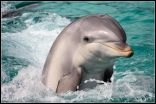(Press-News.org) Dolphins are indeed sensitive to magnetic stimuli, as they behave differently when swimming near magnetized objects. So says Dorothee Kremers and her colleagues at Ethos unit of the Université de Rennes in France, in a study in Springer's journal Naturwissenschaften – The Science of Nature. Their research, conducted in the delphinarium of Planète Sauvage in France, provides experimental behavioral proof that these marine animals are magnetoreceptive.
Magnetoreception implies the ability to perceive a magnetic field. It is supposed to play an important role in how some land and aquatic species orientate and navigate themselves. Some observations of the migration routes of free-ranging cetaceans, such as whales, dolphins and porpoises, and their stranding sites suggested that they may also be sensitive to geomagnetic fields.
Because experimental evidence in this regard has been lacking, Kremers and her colleagues set out to study the behavior of six bottlenose dolphins in the delphinarium of Planète Sauvage in Port-Saint-Père. This outdoor facility consists of four pools, covering 2,000 m² of water surface. They watched the animals' spontaneous reaction to a barrel containing a strongly magnetized block or a demagnetized one. Except from this characteristic, the blocks were identical in form and density. The barrels were therefore indistinguishable as far as echolocation was concerned, the method by which dolphins locate objects by bouncing sound waves off them.
During the experimental sessions, the animals were free to swim in and out of the pool where the barrel was installed. All six dolphins were studied simultaneously, while all group members were free to interact at any time with the barrel during a given session. The person who was assigned the job to place the barrels in the pools did not know whether it was magnetized or not. This was also true for the person who analyzed the videos showing how the various dolphins reacted to the barrels.
The analyses of Ethos team revealed that the dolphins approached the barrel much faster when it contained a strongly magnetized block than when it contained a similar not magnetized one. However, the dolphins did not interact with both types of barrels differently. They may therefore have been more intrigued than physically drawn to the barrel with the magnetized block.
"Dolphins are able to discriminate between objects based on their magnetic properties, which is a prerequisite for magnetoreception-based navigation," says Kremers. "Our results provide new, experimentally obtained evidence that cetaceans have a magenetic sense, and should therefore be added to the list of magnetosensitive species."
INFORMATION:
Reference: Kremers, D. et al. (2014). Behavioural evidence of magnetoreception in dolphin: Detection of experimental magnetic fields. Naturwissenschaften – The Science of Nature. DOI 10.1007/s00114-014-1231-x
The full-text article and the image are available to journalists on request.
Contact:Laura Zimmermann | Springer | Corporate Communications
tel +49 6221 487 8414 | laura.zimmermann@springer.com
Dolphins are attracted to magnets
Add dolphins to the list of magnetosensitive animals, French researchers say
2014-09-29
ELSE PRESS RELEASES FROM THIS DATE:
Human trafficking, an invisible problem
2014-09-29
This news release is available in Spanish. This study compares the existing legislation on this subject in European countries and analyzes both the level of protection afforded to the victims and the measures taken to avoid this crime; in addition, it proposes of code of best practices that favors the enactment of new European guidelines aimed at ending this activity. Specifically, it shows that one of the first obstacles to change is that the magnitude of the problem is not known, points out one of the authors of the report, Begoña Marugán Pintos, of the department ...
Evolutionary biology: It's not just for textbooks anymore
2014-09-29
Solving global challenges in food security, emerging diseases and biodiversity loss requires evolutionary thinking, argues a new study published online in Science Express that was co-authored by Bruce Tabashnik of the University of Arizona College of Agriculture and Life Sciences.
For the first time, an international team of nine scientists has reviewed progress in addressing a broad set of challenges in agriculture, medicine and environmental management using approaches that consider evolutionary histories and the likelihood of rapid adaptation to human activities.
The ...
IMPRESS trial data on continuing tyrosine kinase inhibitor therapy after resistance development in lung cancer reported
2014-09-29
Patients whose lung cancer has developed resistance to the drug gefitinib experience no statistically significant improvement in progression-free survival from continued treatment with the drug in addition to chemotherapy, a phase III trial presented at the ESMO 2014 Congress has shown.
The IMPRESS trial is a randomised phase III study that compared continuation of gefitinib in addition to chemotherapy against chemotherapy alone in patients with lung cancer that carried mutations in the EGFR cell surface receptor.
Gefitinib is a type of drug known as a tyrosine kinase ...
Pertuzumab adds 16 months survival benefit to trastuzumab and chemo treatment for HER2-positive breast cancer
2014-09-29
Patients with HER2-positive breast cancer that has spread to other parts of their body live around 16 months longer if treated with a combination of pertuzumab, trastuzumab and chemotherapy compared to those treated with trastuzumab and chemotherapy alone, updated results from the CLEOPATRA study reveal.
CLEOPATRA was a pivotal phase III study where researchers evaluated the safety and efficacy of pertuzumab, trastuzumb and chemotherapy in 808 patients with previously untreated HER2-positive metastatic breast cancer. HER2-positive metastatic breast cancer has historically ...
Adding cediranib to chemo improves progression-free survival for meta or recurrent cervical cancer
2014-09-29
For patients with cervical cancer that has recurred after treatment or has spread elsewhere in the body, adding the experimental drug cediranib to standard chemotherapy improves tumour shrinkage and adds a modest improvement in progression-free survival, researchers report at the ESMO 2014 Congress in Madrid.
In Europe, about 70% of patients with cervical cancer are cured by either surgery or chemo-radiotherapy. Those patients with recurrent or secondary cancer have a very poor outlook. Only about 20-30% have tumour shrinkage after conventional chemotherapy and survival ...
Many patients lack information about the use of targeted therapies, oncologists say
2014-09-29
More than three quarters of oncology specialists in Europe, South America and Asia believe their patients are not always well enough informed about the treatment options available to them, survey results have revealed at the ESMO 2014 Congress in Madrid, Spain.
The results come from an online survey of 895 doctors from 12 countries in Europe, South America and Asia. All were practicing oncology specialists, with more than three years' experience, treating more than fifteen patients a month.
While 82% of those surveyed believed that deciding on a course of treatment ...
Under-representation of women in oncology leadership positions
2014-09-29
A growing number of oncologists in Greece are female, but women continue to be under-represented in leadership positions, according to a survey reported at the ESMO 2014 Congress.
"In Greece, and across Europe, women oncologists still find it hard to access leadership or academic positions," said Dr Helena Linardou, Associate Director of the 1st Department of Oncology at the Metropolitan Hospital, Athens, Greece, who presented the survey results at the congress.
"Women are indeed increasingly choosing oncology specialties in Greece, however, most decision-making posts ...
Is expressive suppression effective in reducing negative emotion?
2014-09-29
A recent study based on a Chinese sample gives an answer to this question. The research shows that in Chinese culture, emotion- expressive suppression is not only able to dampen negative emotion effectively, but also dampen negative emotion faster than Cognitive reappraisal. This sheds much light on how to quickly regulate negative emotion in urgent situations, particularly when people from East-Asian cultures are concerned.
This study has been published in SCIENCE CHINA: Life Sciences (IN CHINESE) , which is titled "The efficiency of negative emotion regulation: ...
Using the brain to forecast decisions
2014-09-29
You're waiting at a bus stop, expecting the bus to arrive any time. You watch the road. Nothing yet. A little later you start to pace. More time passes. "Maybe there is some problem", you think. Finally, you give up and raise your arm and hail a taxi. Just as you pull away, you glimpse the bus gliding up. Did you have a choice to wait a bit longer? Or was giving up too soon the inevitable and predictable result of a chain of neural events?
In research published on 09/28/2014 in the journal Nature Neuroscience, scientists show that neural recordings can be used to forecast ...
Smart, eco-friendly new battery to solve problems
2014-09-29
Present-day lithium batteries are efficient but involve a range of resource and environmental problems. Using materials from alfalfa (lucerne seed) and pine resin and a clever recycling strategy, Uppsala researchers have now come up with a highly interesting alternative. Their study will be presented soon in the scientific journal ChemSusChem.
'We think our discovery can open several doors to more environment-friendly, energy-efficient solutions for the batteries of the future,' says Daniel Brandell, Associate Professor at the Department of Chemistry, Uppsala University, ...
LAST 30 PRESS RELEASES:
Nutrient uptake gets to the root of roots
Aspirin not a quick fix for preventing bowel cancer
HPV vaccination provides “sustained protection” against cervical cancer
Many post-authorization studies fail to comply with public disclosure rules
GLP-1 drugs combined with healthy lifestyle habits linked with reduced cardiovascular risk among diabetes patients
Solved: New analysis of Apollo Moon samples finally settles debate about lunar magnetic field
University of Birmingham to host national computing center
Play nicely: Children who are not friends connect better through play when given a goal
Surviving the extreme temperatures of the climate crisis calls for a revolution in home and building design
The wild can be ‘death trap’ for rescued animals
New research: Nighttime road traffic noise stresses the heart and blood vessels
Meningococcal B vaccination does not reduce gonorrhoea, trial results show
AAO-HNSF awarded grant to advance age-friendly care in otolaryngology through national initiative
Eight years running: Newsweek names Mayo Clinic ‘World’s Best Hospital’
Coffee waste turned into clean air solution: researchers develop sustainable catalyst to remove toxic hydrogen sulfide
Scientists uncover how engineered biochar and microbes work together to boost plant-based cleanup of cadmium-polluted soils
Engineered biochar could unlock more effective and scalable solutions for soil and water pollution
Differing immune responses in infants may explain increased severity of RSV over SARS-CoV-2
The invisible hand of climate change: How extreme heat dictates who is born
Surprising culprit leads to chronic rejection of transplanted lungs, hearts
Study explains how ketogenic diets prevent seizures
New approach to qualifying nuclear reactor components rolling out this year
U.S. medical care is improving, but cost and health differ depending on disease
AI challenges lithography and provides solutions
Can AI make society less selfish?
UC Irvine researchers expose critical security vulnerability in autonomous drones
Changes in smoking status and their associations with risk of Parkinson’s, death
In football players with repeated head impacts, inflammation related to brain changes
Being an early bird, getting more physical activity linked to lower risk of ALS
The Lancet: Single daily pill shows promise as replacement for complex, multi-tablet HIV treatment regimens
[Press-News.org] Dolphins are attracted to magnetsAdd dolphins to the list of magnetosensitive animals, French researchers say


